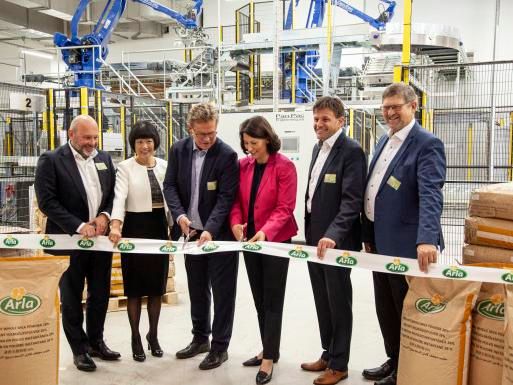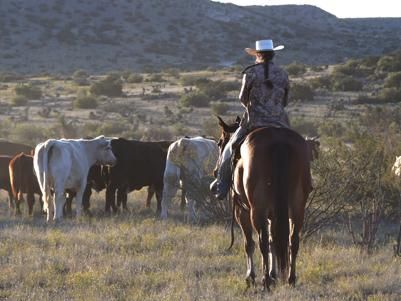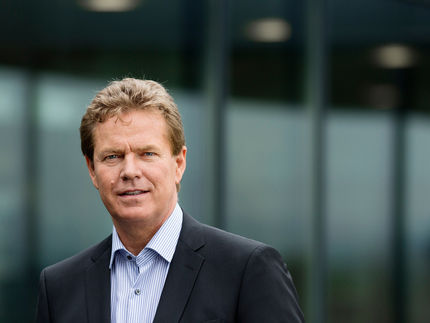Arla strengthens international business
New 190 million euro production plant inaugurated
Advertisement
After around three years of construction, the European dairy cooperative Arla Foods, headquartered in Viby, Denmark, today officially inaugurated its new milk powder production plant in Pronsfeld, Rhineland-Palatinate. With the second milk powder production plant at the largest Arla site in the world, the dairy cooperative is strengthening its international business, particularly to meet the rising global demand for affordable, nutritious dairy products. The plant will also manufacture products for the B2B business with the food processing industry, which uses milk powder in chocolate or baked goods, for example. The total investment volume of the construction project, including a new energy center, is 190 million euros, around 22 percent of which went to companies in the regional economy in the Eifel and Rhineland-Palatinate via contracts put out to tender. The plant, the centerpiece of which is a 51-meter-high drying tower, can process 685 million kilograms of milk a year into around 90,000 tons of high-quality milk powder. In the German market, Arla is among the top five in the dairy industry, with brands such as Arla Buko, Arla Skyr and Kærgården, as well as private labels in food retailing. The company has its Germany headquarters in Düsseldorf.

(from left to right): David Boulanger (Chief Production Officer, Arla Group), Lillie Li Valeur (Head of Arla Germany), Peder Tuborgh (CEO, Arla Group), Daniela Schmitt (Minister of Economic Affairs, Rhineland-Palatinate), Jürgen Wolf (Plant Manager Arla Pronsfeld), Jan Toft Nørgaard (Chairman of the Supervisory Board Arla Group).
Arla Gruppe
"I am very pleased to inaugurate this new production facility at our Pronsfeld plant today. Providing as many people as possible with access to good, nutritious food every day is one of the biggest challenges we face worldwide. As part of our five-year strategy Future26, we will strengthen and expand our business in international markets such as the Middle East, West Africa and Southeast Asia. There, consumer demand for affordable, nutritious dairy products is outstripping local production as well as local supply. As the largest Arla plant in the world with a strong export business, the new production facility gives the Pronsfeld site even greater importance in the growth strategy of our international business," said Peder Tuborgh, CEO of the Arla Group, in front of numerous guests at the official inauguration.
Daniela Schmitt, Minister of Economics, Transport, Agriculture and Viticulture of the State of Rhineland-Palatinate, attended the opening ceremony as guest of honor. In her welcoming address, she emphasized the great importance of the Arla plant as one of the most important employers in the region and was very pleased that the dairy cooperative had made a massive investment in the site with the new production facility. "Their investment will keep this dairy site efficient and competitive," Schmitt said. "The Eifel region offers ideal conditions for producing high-quality raw milk - the basis for a diverse product range. However, the raw milk produced must not only be produced, but it must also be processed and marketed in creative, climate-friendly ways. This is where Arla sets standards throughout Europe. In this regard, I particularly welcome the fact that milk-producing farms are also included in the sustainability strategy."
Plant boss Jürgen Wolf also made it clear how closely connected the company is to the region: "Arla, our employees and our cooperative members, the dairy farmers, are deeply rooted in the region. Our plant with almost 1,000 employees is an important economic factor in the Eifel region and beyond. I am therefore particularly pleased that this major project has succeeded in further strengthening and expanding the site. The fact that orders worth around 42 million euros of the total investment volume have gone to companies in the Eifel and Rhineland-Palatinate clearly shows how intensively we work together with the local economy."
International business of the Arla Group to be further expanded
Globally, the Arla Group is currently present in around 140 countries with annual sales in its international business of 2.10 billion euros last year; an increase of 6.6 percent compared to 2020. Under the company's Future26 strategy, the dairy cooperative expects annual volume growth of 5 to 7 percent in its international brand business. For further growth, Arla is also particularly focusing on West Africa and the Southeast Asia region. Many countries in these regions are often characterized by strong population growth, nutritional deficiencies and low levels of self-sufficiency in nutritious food. Take Nigeria, for example: the country is one of the fastest growing nations in the world. According to United Nations forecasts, the population there will increase by 28 percent by 2030 and nearly double to almost 400 million people by 2050. There is already growing demand for affordable dairy products there. However, Nigeria's dairy sector is currently only able to meet less than 10 percent of the country's demand for dairy products. As a result, the country relies on food imports, such as products made from nutritious milk powder, which are an integral and important part of the local diet , especially in fast-growing, urban areas.
In this context, Arla is pursuing a two-pronged approach as part of its sustainable growth strategy in Nigeria, as in other international markets. On the one hand, the dairy cooperative ensures food security with imported food, and on the other, the company supports the development of a sustainable dairy sector locally through public-private partnerships. In Nigeria, this includes setting up milk collection points, marketing products from local production, and training local farmers.
Due to its nature and long storage life, milk powder is particularly suitable for long transport routes without refrigeration. The products manufactured in Pronsfeld are branded products sold under brand names such as Arla Dano. In the destination countries, the milk powder is repackaged into smaller consumer packs. Consumers then make drinking milk from it with the addition of drinking water.
Focus on sustainability in production
As Arla Foods announced at the beginning of the year, the dairy cooperative has set itself the goal of complying with the 1.5 degree target of the Paris Agreement in the area of its own production facilities. For example, greenhouse gas emissions from production, logistics and energy use are to be reduced by 63 percent by 2030. And the construction of the new plant for milk powder production and the associated expansion of the plant's infrastructure also had a special focus on sustainability. For example, the new, expanded refrigeration plant in conjunction with the new energy center for generating electricity and heat (CHP: combined heat and power plant driven by a gas turbine) saves around 1,800 megawatt hours of electricity and approximately 1,200 metric tons of CO2 per year compared to a conventional refrigeration plant with an electrically driven compressor. The cooling capacities are required for various production steps throughout the plant. As no "green" energy alternative is currently available on a sufficient scale at the site, Arla will, as a short-term solution, purchase green electricity certificates corresponding to the CO2e emissions for both the gas used in the new production tower and the electricity used there. In addition, the dairy cooperative is looking into replacing 25 percent of the natural gas used in the energy center with green hydrogen in the future, which would help improve the plant's carbon footprint.
Facts about the Arla Pronsfeld plant:
Size: Largest Arla production site worldwide and one of the largest dairy plants in Europe. The total area covers around 55 hectares, equivalent to 77 soccer fields.
Employees: just under 1,000 employees, around 30 apprentices in 10 trades.
Milk suppliers: The milk comes from Arla farmers in the catchment area of Rhineland-Palatinate, North Rhine-Westphalia, Luxembourg and Belgium with Wallonia and Flanders.
Processing volume in 2021: 1.5 billion kg of processed milk.
Worldwide export: around 70 countries around the globe, including China, Kuwait & the Maldives. Central location for the Arla Group's international business.
Products: specialized in long-life dairy products: Drinking milk, cream, mixed milk drinks, condensed milk, sour cream as well as milk powder, butter and blended spreads.
Facts about the 2nd drying tower for milk powder production in Pronsfeld:
Investment sum: total investment of 190 million euros in around three years.
Construction period: 2019 - 2021. Startup: spring 2022.
Capacity of the plant: 685 million kg of milk (approx. 90,000 tons of milk powder) p.a., Height of the building: 51 m.
Major project: a total of 12 major construction sites on the plant site during the course of the project. From the expansion of the milk reception and treatment plant, to additional milk tanks and a new energy center.
Products: Milk powder; marketing under brand names such as Arla Dano.
Note: This article has been translated using a computer system without human intervention. LUMITOS offers these automatic translations to present a wider range of current news. Since this article has been translated with automatic translation, it is possible that it contains errors in vocabulary, syntax or grammar. The original article in German can be found here.




























































